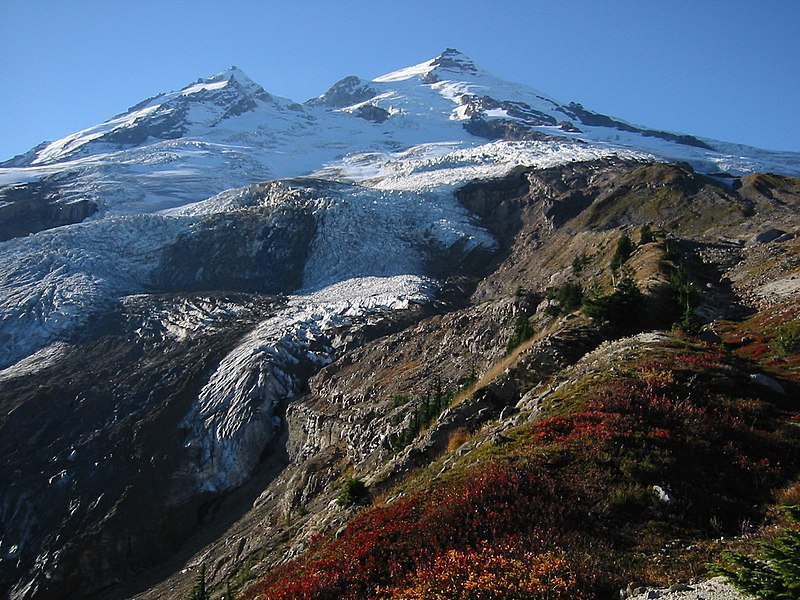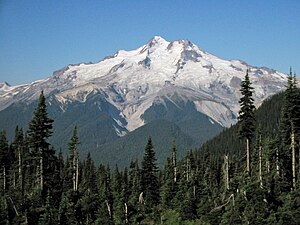One thing we do is look for mountains.
Snow-capped mountains.
Because 2,500 years ago, the Jewish Supreme Council enacted a special bracha to make when you see a snow-capped mountain for the first time in 30 days.
It used to be that everyone made up their own brachas. That was when all the Jews lived in the Land of Israel and everyone spoke Hebrew.
After we were scattered to the four corners of the globe, the rabbis supposed that over time, different sorts of Judaism would emerge and eventually there would be no more Jewish people, rather Jewish peoples. So they created a common liturgy to try to keep us together. That’s one reason why we don’t invent our own brachas anymore. It’s a slippery slope.
Another reason is that few of us have mastered the hundred or so brachas that already exist.
One of the easiest to relate to is the snow-capped mountain bracha.
Flying from Seattle on a clear day is an uplifting experience (pardon the pun).

On your left,
Mt. Baker.
 Hey, there's Glacier Peak!
Hey, there's Glacier Peak! On your right, Mt. Ranier so close you could reach out and touch it.
On your right, Mt. Ranier so close you could reach out and touch it. 
Over there, Mt. Adams....
Is that Mt. Hood in the distance?

When I asked a religious guy I know how many times he’s bentched a mountain, he told me, incredibly, none!
“Why not, haven’t you ever seen a snow-capped mountain?”
“Yes, but I didn’t know there was a special bracha for it.”
I thought, How could there not be a bracha? It is such an awesome experience.
You see, if you’ve read The Art of Amazement then you know that bracha is not a religious ritual, it is rather a meditation on the awesome experience of this moment and the greatest awe of all, the fact that I am here to experience it.
So here’s a question for your table: What’s more important, the experience of awe, or the articulation of that awe through something like a bracha?
(Hat’s off to Southwest, by the way, for making sure that everyone and their baggage made their connections, despite the disruptions on Thursday.)
If you would like a list of many little-known brachas, see Ch. 5 and Appendix F of the book, or send me an email.
Shabbat Shalom
Speaking schedule:
August 7-8 – St. Louis (CAJE):
"You Can Teach the Talmud!"
"Combating Missionaries: The 'Why be Jewish?' Defense"
"Two Plus Five: How to Teach Spirituality"
August 15-16 – Los Angeles (Helkeinu)
Yiddish of the week:
bentch — make a bracha
Yiddish review - how many do you know?
anee — poor person
koptsen — panhandler
ballaboss — homeowner; layman
nu — various meanings (see archives)
mishpocha — family
mameh — mother
tateh — father
mazal – (MAH-z’l) luck or fortune, as in, “It was good mazal that....”
beshert – (b’shairt) - meant to be, as in “It was beshert that...”
mine eltern – my parents
mine lair-er – my teacher
hamantashen – Haman-pockets
zeigezunt – all the best (said upon parting)
kesher - connection
Ikh volt veln a kave, zayt azoy gut. - I'd like a coffee, please.
...kave mit shmant. – ...a coffee with cream.
...kave mit milkh. – ...a coffee with milk.
...kave mit tsuker. - ...a coffee with sugar.
Di Fir Kashes - The Four Questions
Oy vey! - Good grief!
mensch — a decent person
rachmanos — mercy
neshoma (neh-SHOH-ma) — soul
minig — custom, as in, "Why do you do that?" "It's my minig!"
Gavaltig — wonderful
Oy gavalt — how wonderful (sarcastic)
Azoy gait es! — That’s how it goes!
Shabbos — Cessation; stopping; day of stopping; weekly sabbatical experience
"Gut Shabbos" — "Enjoy your weekly sabbatical experience"
Neshoma — Soul
meshugass — insanity
meshuganeh — insane
kyna hara — no evil eye
shvitz — sweat
shanda — shame
Lechayim! — Cheers!
Pinteleh Yid — the Jewish feeling in the heart of every Jew
Zreezus — zeal
Mkohm — place (pl. mkohmas)
mamalashen — mother tongue
No comments:
Post a Comment